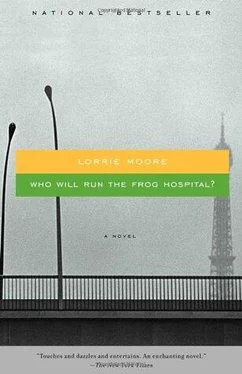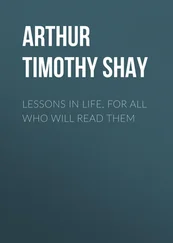“Where’ve you been?” asked Sils. She and Mike were now out of the car but leaning against it sexily.
“For a walk.”
Mike turned toward Sils. “I should get this car back.”
“Bye,” she said.
He kissed her again, in front of me. “I’ll phone you tomorrow,” he said. He got in the car and did a three-point turn — I’d been learning those at school, in Driver’s Ed — and then he zoomed away.
In the kitchen we fixed a quick, late-night breakfast: saltines and hot chocolate made from Bosco. We dipped the crackers in the hot chocolate and let them get soggy and float there, like gunk in a pond.
“Once in third grade,” said Sils, “I didn’t want to go to school, so I chewed up a bunch of saltines, kept them in my mouth and went upstairs, groaning, and spat them at my mother’s feet.”
“So attractive!” I said, and we giggled in an exhausted way.
“It worked.” She was dreamy-eyed, drowning the crackers in her cup with a spoon.
“Ingenious,” I said. I hoped she would glance up from her drink, look at me, say more. But she didn’t.
Later, sprawled on top of the covers on her bed, which was a mattress on the floor of her room, Sils let out a long, satisfied sigh. At the foot, in the dim light of the little lamp she kept on when I was there, I lay curled in a sleeping bag and looked at her, beginning with her toes: the rubbery blue nexus of veins on top of her feet, the tendons splayed like the bones of a fan, the discolored sheen of the nails shimmery and vague as mother-of-pearl. The nuts and bolts of her were always interesting. She saw me looking.
“You’ve got wild toes,” I said.
She yanked one foot toward her chest. “Did I ever show you these?”
“What?”
She examined her foot studiously. “In my toenails you can see Napoleon Solo and Illya Kuryakin.”
“What are you talking about?” I pushed deeper into the sleeping bag and pretended to laugh at her.
“I’m serious,” she said. “You can see their faces.” She lowered her foot. “I’ll show you tomorrow.” She sighed again, thinking of Mike, I was sure. “Thanks, Berie,” she said.
“For what?”
“For whatever.” Then she fell completely to sleep, and in the low light for a while I watched my own shadow against the wall, a lumpy mountain range thrusting up peaks and crashing them again to avalanche and rubble, in a long, long restlessness that finally preceded sleep.
Often when I went over to Sils’s house, she would have the side door unlocked and a salad or a cottage cheese sandwich waiting for me on the kitchen counter. A salad! A cottage cheese sandwich! How odd in memory to conjure it, the dressed cucumbers and celery assembled as if by a wife for her husband; or the sandwich, sweet and sloppy with mayonnaise. I would take it, eat it, then go upstairs to her room and sit next to her, strum the guitar with her, singing harmony to folk songs like “Geordie” or “The Water Is Wide I Cannot Get O’er,” feeling myself a goner in the minor-seven chords, their sad irresolution stirring in me something lost and heartbroken, though how could that be, I was only fifteen. Still, something deeply sad had been born buried in me, stirring occasionally inside like a creature moving in sleep. Often I found myself concentrating on the frog painting, entering it with my eye, as if it were perhaps a dreamy illustration from a real-life fairy tale, or a secret passageway into another secret passageway. A joke into a secret joke into a secret. When we were younger, Sils and I had always looked for caves together, or some small undiscovered duck pond with ducks. We’d go to the Grand Union and cheer on the lobsters who had managed to break free of their rubber bands. We’d build a half-tent out of three open umbrellas and we’d get underneath it and play cards. We’d walk miles to the county dump to see the bears. By the time we were twelve, we’d bike to the head shop and buy wisteria incense. Or we’d go downtown to the Orpheum, say we were sixteen and see an R-rated movie, occasionally a foreign one, which would mesmerize and perplex us. We’d eat Junior Mints and popcorn — each candy a sweet pillow on the tongue; each popped corn as big and complicated as a catalpa bloom. On a dare we might even drink the blueberry punch, which was the color of Windex and shot up the sides of the Jet-Spray cooler like some wonder of nature; no one else in our town had ever drunk it. That’s what the man behind the counter always said. We would wash it down with water from the lobby fountain. Then we would sit in the dark, on the left, to watch the movie from an angle, eyes peeled for flesh. At thirteen, we would hang out at W. T. Grant’s, buying bras and ice-cream sundaes, and trying on men’s sweaters, the bottoms of which, when we wore them at school, stretched out shapelessly, the hem warped and hanging around by our knees: that was the look we wanted. At fourteen, we would claim to be sleeping over at each other’s house, and then we’d stay out all night, go to the railroad tracks, and from old mayonnaise jars drink liquor collected from our parents’ own supply. Then we’d sleep in the family station wagon in the driveway, wake early, get donuts at Donna’s Donuts at dawn when both the raised and glazed ones were still warm.
But increasingly now I was alone with my outings, wondering what it was like for Sils with her boyfriend Mike, what they did together, what were all the things I didn’t yet even know to ask, and, now that she had gone to a new advanced place I hadn’t, whether she liked me less.
In some ways my childhood consisted of a kind of wasting away, a wandering dreamily through woods and illegally in the concrete sewer pipes, crawling, or pleasantly alone in the house (everyone gone for an hour !) chewing the salt out of paper bits, or hiding under quilts in the afternoon to form a new place somehow, a new space that had never existed before in the bed, like a rehearsal for love. Perhaps in Horsehearts — a town named for an old French and Indian War battle, one full of slaughtered horses whose bodies bloodied the village pond and whose hearts were said to be buried on Miller Hill just south — the only things possible were deferment and make-believe. My childhood had no narrative; it was all just a combination of air and no air: waiting for life to happen, the body to get big, the mind to grow fearless. There were no stories, no ideas, not really, not yet. Just things unearthed from elsewhere and propped up later to help the mind get around. At the time, however, it was liquid, like a song — nothing much. It was just a space with some people in it.
But one can tell a story anyway.
One can get a running start, then begin, do it, and be done.
Things, I know, stiffen and shift in memory, become what they never were before. As when an army takes over a country. Or a summer yard goes scarlet with fall and its venous leaves. One summons the years of the past largely by witchcraft — a whore’s arts, collage and brew, eye of newt, heart of horse. Still, the house of my childhood is etched in my memory like the shape of the mind itself: a house-shaped mind — why not? It was this particular mind out of which I ventured — for any wild danger or sentimental stance or lunge at something faraway. But it housed every seedling act. I floated above it, but close, like a figure in a Chagall.
Before we had renovated our house, it had only one bathroom for the entire family and often I would rush to use it, finding the line three kids deep; there was a mirror in the hall and we used to clutch our groins and hop around, watching ourselves, hoping we wouldn’t explode. There were only two bedrooms for three children — the yellow room and the blue room. For a while my foster sister LaRoue, and my brother, Claude (in Horsehearts, pronounced clod ), and I took turns sharing. Because LaRoue had first arrived at our house with another foster child who no longer lived with us — a slow, quiet girl named Nancy who had been beaten retarded by her mother — the two of them shared a room until Nancy went away, and then LaRoue was left with her own. I don’t think I ever actually knew why or where Nancy went; our house was always inhabited by people other than us, all camped out on the Hide-A-Beds. That’s why I’d sought Sils early, when I was nine, found her right there in my homeroom, alphabetized next to me, in the C s, and attached myself to her.
Читать дальше












